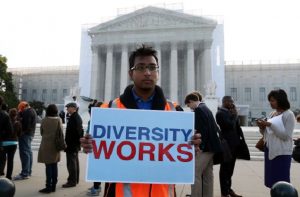(Image via Getty)
We’ve talked a lot about the applicants getting jobbed by states refusing to step back from the insanity of in-person bar exams and the flimsy support behind the argument that bar exams protect the public. But what about the argument that bar exams affirmatively hurt the public?
This is something we’ve broached indirectly in discussions of California’s cut score changes. Extensive research of the cut score question revealed that the state’s insistence on one of the highest cut scores in the country had contributed to a massive access to justice gap in the state. But across the country, even more reasonable states are still picking cut scores based not on “minimum competency” but on reaching benchmark failure rates so they can report back that the exam failed 25 percent of takers and, circularly, “did its job.”
And the people that tends to hurt are the most vulnerable clients.
Each year, more than 24,000 law school graduates begin jobs that require bar admission. Approximately half of these graduates serve the needs of low- and middle- income communities and small businesses. Disrupting the flow of new lawyers into direct-service providers, government offices, and other public interest legal positions will further undermine access to justice for under-resourced communities that already struggle to obtain legal assistance. The threats our marginalized communities face are especially grave at this moment: a wave of mass evictions appears imminent, workers continue to face unsafe working conditions, and voter suppression foreshadows “a potentially disastrous November election.” We need licensed law graduates to meet the needs of these communities right away.
That’s from an open letter from public interest organizations put together by the Public Rights Project seeking signatures this week. The signatories argue that some form of diploma privilege would be in the interests of the public they serve.
And it makes sense because while one can perform upwards of 99 percent of first-year duties in a Biglaw firm without a license, leaner staffed public interest organizations — not to mention small firms serving lower- and middle-income clients — depend on folks ready to perform all the tasks of a licensed attorney from jump. We’ve mocked the “practice waiver” idea as mostly useless but there is some short-term value in this space. But it’s still a joke of a solution because those same employers are also depending on not having that applicant go MIA for three months when they need to actually take the exam down the road as most practice waiver regimes contemplate.
The people making these bar exam decisions are, for the most part, incredibly lazy about addressing concerns brought to their attention, but we can’t just give up because they try to gloss over the issue. Every time someone says the bar exam is about protecting the public, challenge them to define the public they’re talking about. Bar examiners and state supreme court justices keep cooking up hypos about poor widows and orphans swindled by shoddy attorneys but the people actually serving those communities are calling for diploma privilege while those imaginative critics remain cloistered in layers of privilege.
If you’re in the public interest game, let your organization know about this letter and sign on. The signature period lasts until Friday.
An Open Letter from Public Interest Legal Organizations Supporting Diploma Privilege [Medium]
 Joe Patrice is a senior editor at Above the Law and co-host of Thinking Like A Lawyer. Feel free to email any tips, questions, or comments. Follow him on Twitter if you’re interested in law, politics, and a healthy dose of college sports news. Joe also serves as a Managing Director at RPN Executive Search.
Joe Patrice is a senior editor at Above the Law and co-host of Thinking Like A Lawyer. Feel free to email any tips, questions, or comments. Follow him on Twitter if you’re interested in law, politics, and a healthy dose of college sports news. Joe also serves as a Managing Director at RPN Executive Search.



 Jordan Rothman is a partner of
Jordan Rothman is a partner of 


 Jordan Rothman is a partner of
Jordan Rothman is a partner of 








